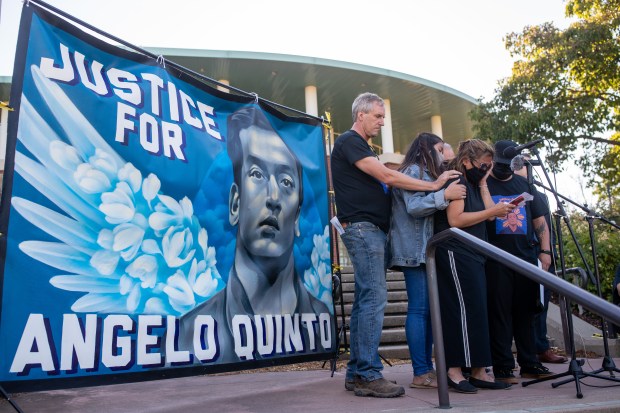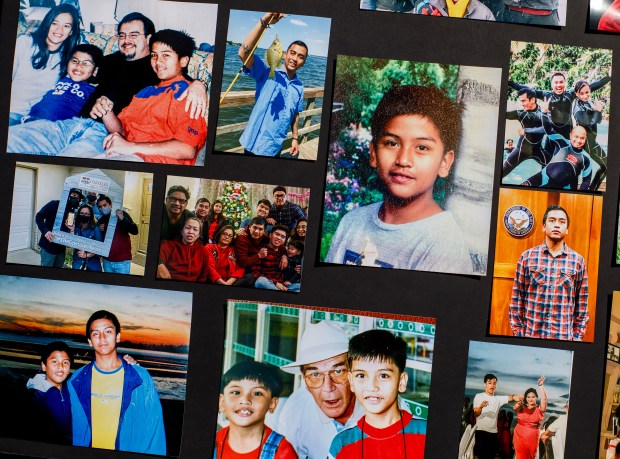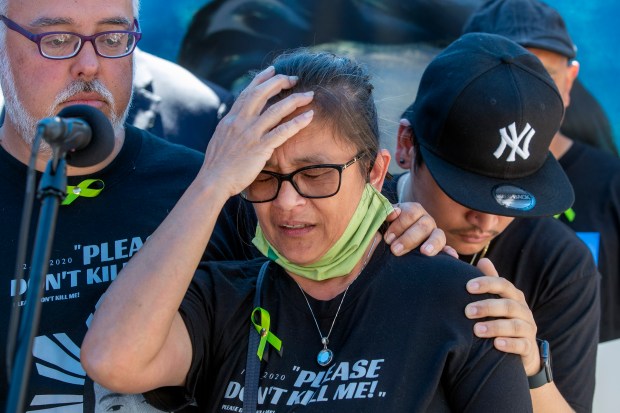“Made from clothes I used to wear. Hold it close and know I’m there. — Love Angelo.”
The spirit of Angelo Quinto is everywhere in the Antioch one-story house where he lived — even a throw pillow with a final message attributed to him is made of red-and-black checkered fabric from his clothes.
It’s emblazoned with a date: 12-26-20.
That’s the day the 30-year-old died, three days after being restrained by police who put a knee on his neck until he became unresponsive. His sister had called them seeking help as Angelo suffered a mental breakdown. That encounter preceded a fundamental change in how California and other states classify in-custody deaths as well as how Antioch police deal with mental health calls.
The family also is set to receive $7.5 million from the city of Antioch after settling a lawsuit they filed following Quinto’s death.

At the core for the Quintos, however, is how the night changed their family forever — and how they might move forward.
“At the end of the day, people will move on with their lives,” said Quinto’s sister, Bella Quinto-Collins, 21. “We have to move on with ours. But nothing is the same, and nothing ever will be. It’s a matter of what the new normal is for us.”
The Quinto family’s agony began Dec. 23, 2020, when Bella dialed 911 and requested help for Angelo. She said she feared he’d hurt their mother, Cassandra Quinto-Collins, who was holding Angelo tight to him, according to legal documents associated with a lawsuit the family filed against the city of Antioch.
When they arrived, the officers pulled Quinto away from his mother, then held him on the floor while handcuffing him. According to legal documents, both officers placed their knees against his neck.
As it all went down, Quinto pleaded with the officers, repeating: “Please don’t kill me.”
Five minutes later, Quinto was showing signs of lifelessness. Authorities summoned an ambulance, and Quinto was rushed to a hospital. He never regained consciousness. Three nights later he was declared dead.
A Contra Costa County coroner’s inquest ruled Quinto’s death accidental. At the hearing, a pathologist testified that Quinto’s “excited delirium” led to the death.
Antioch police waited for more than a month after Quinto’s death to confirm the incident publicly. They didn’t do so until receiving inquiries from this news organization. In their original statement, a police spokesperson said Quinto suffered a “medical emergency” while police were detaining him. They mentioned only that Quinto was handcuffed and made no mention that they had used more serious force.

The aftermath of Quinto’s death thrust the family into the spotlight and the uncomfortable position of sharing their pain with strangers.
Now the spotlight has faded. The family says the goal is simple: Keep living and keep Angelo’s story alive.
As Robert Collins, Angelo’s stepfather, said, “Time goes on. Life goes on.”
As the Quintos move forward, it’s impossible not to see how the police encounter in their home nearly four years ago has shaped their lives.
Bella is working to forge a career in social justice. Robert works to educate about mental illness and the police response to them. He and Cassandra oversee the Angelo Quinto Foundation, which seeks “to shed light on injustices like these, destigmatize mental health, and work toward building a safer community,” according to its website.
Together, they have been part of reshaping policy in California and a movement that is working in other states toward similar goals.
Mike Gipson, 58, represents the South Bay region of Los Angeles County — communities such as Compton, Carson, Willowbrook and Watts, with similar poverty, violence and frustration with their police force as those in Antioch.
Gipson’s relationship with the Quintos spearheaded momentum for the passage of Assembly bills 360, 490 and 1608. AB 360 is the most notable. It banned the term “excited delirium” in California as a “legitimate diagnosis or cause of death for those who have lost their lives while in police custody.”

The bill also made it illegal for peace officers to describe any individual in a police report by using that term and made it illegal for departments to use it as a defense in a civil action.
“That was a meaningful day for us,” Collins said. “We were seeking change and justice — not just for Angelo but for the misjustice done to our family because of how police tried to spin it. To see how decisively that legislation passed, that was a good day.”
Cassandra Quinto-Collins testified in favor of the bill, which sailed through the legislature with bipartisan support. The California Police Chiefs Association did not formally oppose the measure, and it passed with a vote of 75-0.
AB 490 is The Justice for Angelo Quinto Act of 2021, or Angelo’s Law. It bans law enforcement from using restraints encompassing “knee to neck” restraint that can cause asphyxia. AB 1608 — The Angelo Quinto Act of 2022 — separates county coroner offices from sheriff’s departments in all California counties.
The other side of the story for the family is the pain. To hear them tell it, not only did they lose Angelo, they all lost a part of themselves and what they thought to be true.
“I thought they would help us,” Bella Quinto-Collins says of police, recalling the night that as a 17-year-old, she made that call to 911. She stops, shakes her head and swallows hard.

For Cassandra Quinto-Collins, 54, the bitterness is still there.
“I used to believe in the system,” she said. “Not anymore.”
The family worked with the city of Antioch in establishing the city’s first 24/7 non-police mobile crisis response team, the Angelo Quinto Community Response Team, in 2023. It has relieved Antioch police from nonviolent, non-life-threatening, low-level calls that they normally would answer.
Still, the Quintos said they need more from police, something a bit more personal.
“To this day, I don’t think police understand just how re-traumatizing it was to all of us, how badly it hurt us that they just weren’t truthful, that they tried to deceive us,” Bella Quinto-Collins said. “Our purpose now really is to do everything we can to make sure no family ever experiences anything like it again.”
Antioch police did not respond to multiple requests for comment.
Angelo’s spirit helps.
“Hold it close and know I am there.”
“It’s been a long, difficult, tough road for all of us,” Bella said. “It never stops. But we have little victories and sometimes big ones along the way that let us know he’s with us, and that gets us through and helps us heal, and lets us know that he is close and he is here.”
Source: www.mercurynews.com
